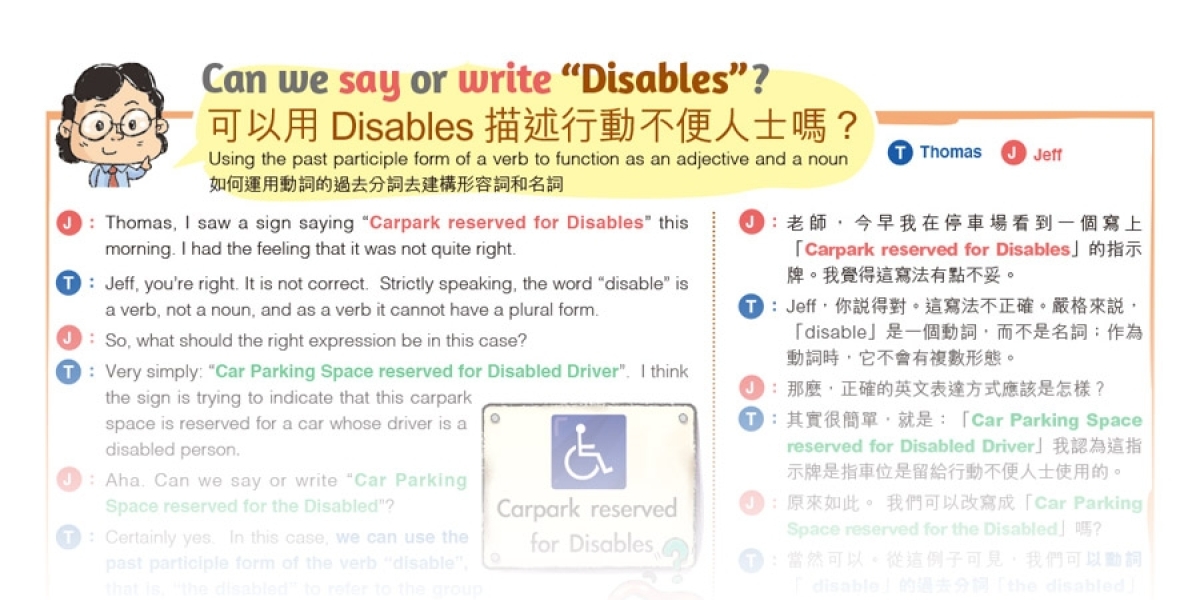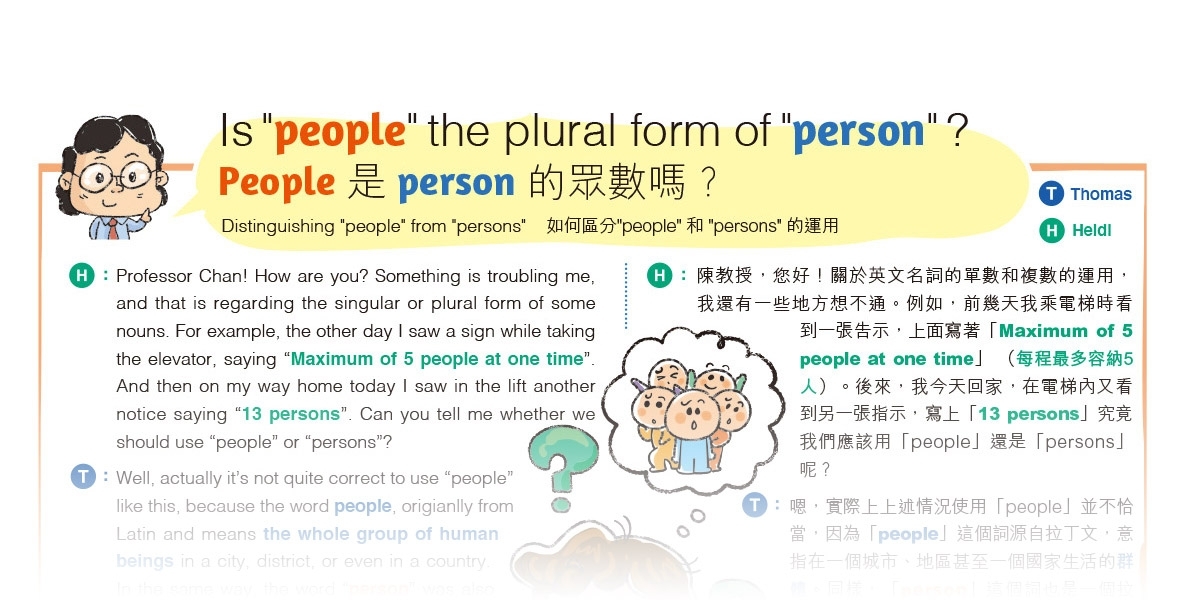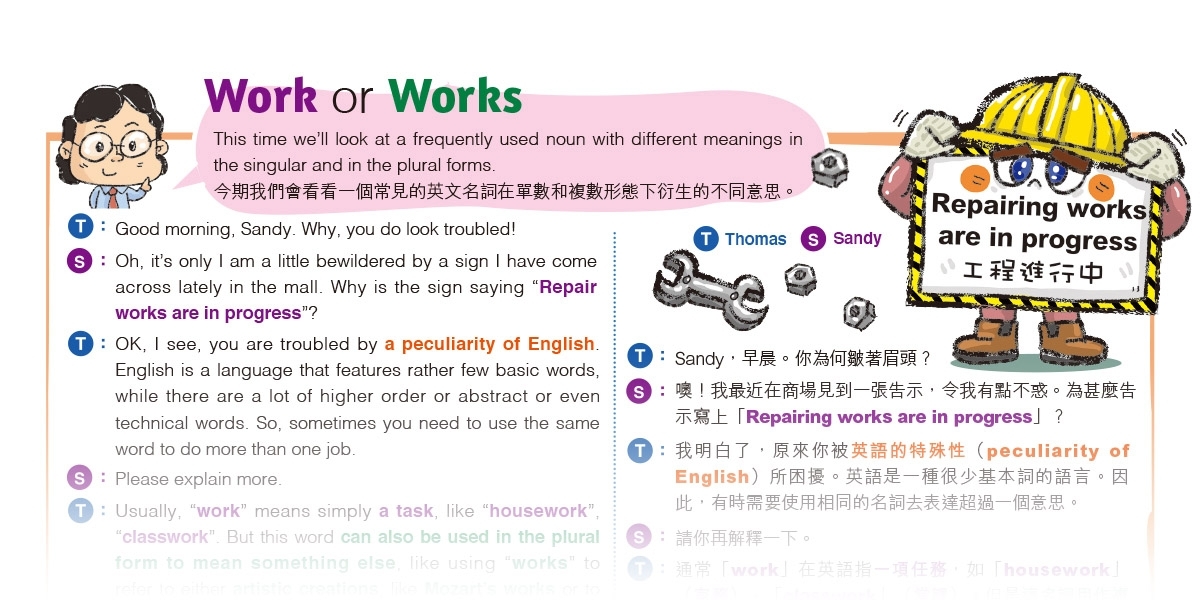昔日文章


Learning English with Thomas
2022.10.30
Can we say or write “Disables” ?
可以用Disables 描述行動不便人士嗎?
T: Thomas J=Jeff
Using the past participle form of a verb to function as an adjective and a noun
J: Thomas, I saw a sign saying “Carpark reserved for Disables” this morning. I had the feeling that it was not quite right.
T: Jeff, you’re right. It is not correct. Strictly speaking, the word “disable” is a verb, not a noun, and as a verb it cannot have a plural form.
J: So, what should the right expression be in this case?
T: Very simply: “Car Parking Space reserved for Disabled Driver”. I think the sign is trying to indicate that this carpark space is reserved for a car whose driver is a disabled person.
J: Aha. Can we say or write “Car Parking Space reserved for the Disabled”?
T: Certainly yes. In this case, we can use the past participle form of the verb “disable”, that is, “the disabled” to refer to the group of people under description, like “the rich”, “the poor”, “the privileged”, etc. See?
J: Loud and clear, Sir. And thank you, Sir.
如何運用動詞的過去分詞去建構形容詞和名詞
J: 老師, 今早我在停車場看到一個寫上「Carpark reserved for Disables」的指示牌。我覺得這寫法有點不妥。
T: Jeff,你說得對。這寫法不正確。嚴格來說, 「disable」是一個動詞,而不是名詞;作為動詞時,它不會有複數形態。
J: 那麼,正確的英文表達方式應該是怎樣?
T: 其實很簡單,就是:「Car Parking Space reserved for Disabled Driver」我認為這指示牌是指車位是留給行動不便人士使用的。
J: 原來如此。 我們可以改寫成「Car Parking Space reserved for the Disabled」嗎?
T: 當然可以。從這例子可見,我們可以動詞「 disable」的過去分詞「the disabled」來描述一個群體, 例如: 「t h e r i c h 」(富人) ,「the poor」(窮人), 「the privileged」(特權人士) 等等,明白嗎?
J: 你的解釋很清楚。謝謝老師。


Learning English with Thomas
2022.09.30
Is "people" the plural form of "person" ?
People 是person 的眾數嗎?
T : Thomas H : Heidi
H : Professor Chan! How are you? Something is troubling me, and that is regarding the singular or plural form of some nouns. For example, the other day I saw a sign while taking the elevator, saying “Maximum of 5 people at one time”. And then on my way home today I saw in the lift another notice saying “13 persons”. Can you tell me whether we should use “people” or “persons”?
T : Well, actually it’s not quite correct to use “people” like this, because the word people, origianlly from Latin and means the whole group of human beings in a city, district, or even in a country. In the same way, the word “person” was also a Latin word and referred to any individual human being. So, the use of “persons” should be used in your example, as we can count one, two, three, four … individuals.
H : I see, thank you Professor!
H : 陳教授,您好!關於英文名詞的單數和複數的運用, 我還有一些地方想不通。例如,前幾天我乘電梯時看到一張告示,上面寫著「Maximum of 5 people at one time」 (每程最多容納5 人)。後來,我今天回家,在電梯內又看到另一張指示,寫上「13 persons」究竟我們應該用「people」還是「persons」呢?
T : 嗯,實際上上述情況使用「people」並不恰當,因為「people」這個詞源自拉丁文,意指在一個城市、地區甚至一個國家生活的群體。同樣,「person」這個詞也是一個拉丁詞,解作一個人。所以,在第一個例子中應該使用「persons」,因為我們可以數算到多少人,即一、二、三、四 ⋯⋯個人。
H : 我明白了,謝謝教授!


Learning English with Thomas
2022.09.25
Work or Works
This time we’ll look at a frequently used noun with different meanings in the singular and in the plural forms.
今期我們會看看一個常見的英文名詞在單數和複數形態下衍生的不同意思。
T: Thomas, S: Sandy
T: Good morning, Sandy. Why, you do look troubled!
S: Oh, it’s only I am a little bewildered by a sign I have come across lately in the mall. Why is the sign saying “Repair works are in progress”?
T: OK, I see, you are troubled by a peculiarity of English. English is a language that features rather few basic words, while there are a lot of higher order or abstract or even technical words. So, sometimes you need to use the same word to do more than one job.
S: Please explain more.
T: Usually, “work” means simply a task, like “housework”, “classwork”. But this word can also be used in the plural form to mean something else, like using “works” to refer to either artistic creations, like Mozart’s works or to construction tasks. One more use of “works” is to refer to an industrial plant, such as motorcar works, meaning factory. For this usage “works” is always used in the plural form.
S: It’s clear now. Thank you, sir!
T: Sandy,早晨。你為何皺著眉頭?
S: 噢 !我最近在商場見到一張告示,令我有點不惑。為甚麼告示寫上「Repairing works are in progress」?
T: 我明白了,原來你被英語的特殊性(peculiarity of English)所困擾。英語是一種很少基本詞的語言。因此,有時需要使用相同的名詞去表達超過一個意思。
S: 請你再解釋一下。
T: 通常「work」在英語指一項任務,如「housework」(家務)、「classwork」(堂課)。但是這名詞用作複數時有另一含義,如「works」解作藝術創作,好似莫扎特嘅作品。又可以指建築工程;或者工廠,例如汽車廠。就此涵義,「works」多數以複數形態出現。
S: 現在我清楚了。多謝老師 !


Learning English with Thomas
2022.09.18
Good Morning or Good Day
T: Thomas J: Joe
J: Good morning Sir! And Good day Sir!
T: Morning Joe! Why did you say good day? Do you know what it means?
J: Yes, the same as good morning, or good afternoon.
T: Wrong, Joe. "Good day" in English doesn’t refer to a form of greeting. It’s rather a form of wish, wishing someone a good day, usually expressed at the point of parting. Maybe you heard something like that from your friend Peter, as he is learning German, I gather. In German “Guten Tag” means good day and it’s a common form of greeting that can be used all day long in Germany and Austria. But there is no counterpart in English.
J: I see. Thank you sir for the explanation. I have to go now. “Good Day” sir!
J: 早晨,老師!Good day !
T: 早晨Joe!為甚麼你會說Good day?你明白Good day的意思嗎?
J: 我明白啊,意思跟good morning 或 good afternoon一樣。
T: 不是這樣的,Joe。英語中「Good day」不是用來打招呼的。反而是一份祝福,祝福某人有美好的一天,通常是道別時表達。可能你曾經從Peter口中聽過類似的說法,我知道他正在學習德文。在德文,「Guten Tag」意味著「美好的一天」,這種問候方式在德國、奧地利十分常見, 可以整天使用。但是在英語裡面就沒有對應的表達。
J: 原來如此。 多謝老師的講解。我現在要走了,「Good Day」老師 !






